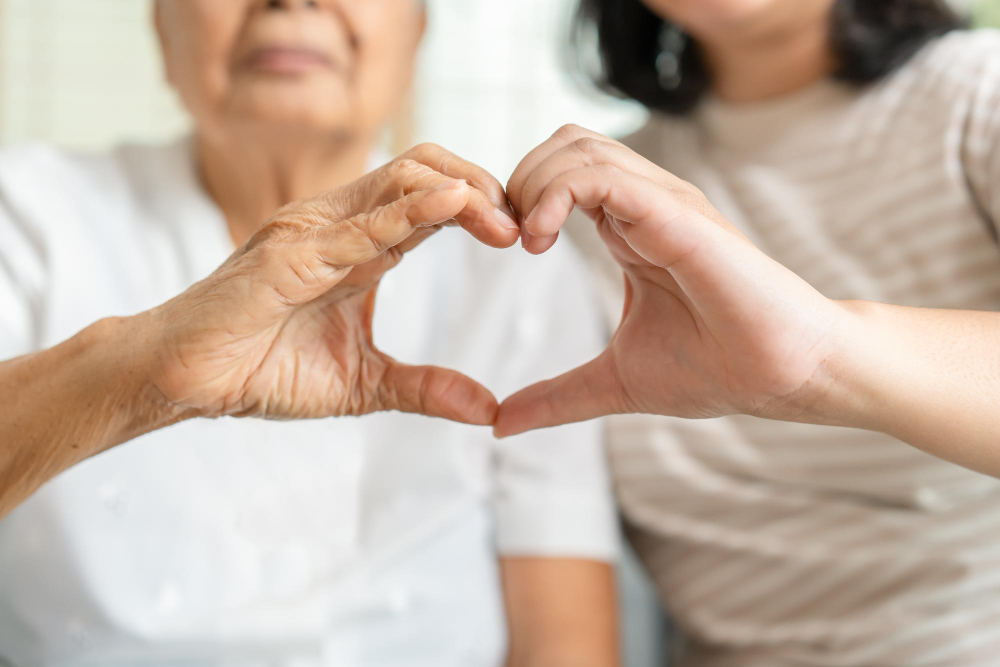
A Comprehensive Guide for Caregivers on Managing Stress in Seniors
Understanding Stress
Before we explore coping techniques, it’s vital to have a clear grasp of what stress entails and how it impacts our physical well-being.
Stress refers to how our body reacts when faced with a situation that demands action. Simply put, it is our reaction to challenging or threatening situations that we encounter in our lives. Stress causes, also known as ‘stressors,’ can be classified as chemical or biological agents, environmental conditions, external stimuli, or events perceived as stressful by an individual. In other words, stressors are anything we consider demanding, challenging, or potentially threatening to our well-being.
When we encounter stressors, our brain’s control center, the hypothalamus, activates a biochemical mechanism to help us cope. This mechanism prompts our body to release stress hormones such as adrenaline, cortisol, and norepinephrine. These hormones affect our body, including increasing heart rate, elevating blood pressure, and boosting energy supplies. This physiological response prepares us for the “fight or flight” mode, enabling us to deal with imminent danger.
It is important to note that while stress hormones can be beneficial in immediate, short-term challenges, they are not intended to be constantly activated. For example, the stress response can be life-saving in life-threatening situations like being trapped in a burning building, facing a personal fear, or experiencing job loss. However, prolonged activation of stress hormones can harm our physical and mental health. When managing stress effectively, it is a clear understanding of how it affects us. With this knowledge, we can explore strategies and techniques to mitigate the harmful effects of stress and promote our overall well-being.
Chronic Stress and Its Effects on Health
Frequent activation of stress hormones such as cortisol, adrenaline, and norepinephrine in our bodies can harm our health.
Chronic stress may manifest in the following signs and symptoms:
Headaches
- Insomnia
- Depression
- Irritability
- High blood pressure
- High blood sugar
- Decreased immune function
- Increased risk of heart attacks and strokes
As we age, our bodies become less resilient and more vulnerable to health issues. Pay close attention to the signs of stress in our senior loved ones, as the above-listed symptoms pose significant health risks.
Signs of Stress in Seniors
As a caregiver, you must be vigilant and attuned to any signs of stress in your loved one. You can implement effective stress management strategies by being aware of these signs early on.
These are some worrying indications that you should keep an eye on:
- Changes in eating habits:
Pay attention to any significant changes in your loved one’s eating patterns. This could include eating too much or not enough.
- Weight gain or weight loss:
Keep an eye on any noticeable fluctuations in your loved one’s weight, which could indicate stress-related issues.
- Mood changes:
Look out for shifts in your loved one’s mood, such as increased irritability, anxiety, sadness, indifference, or even unusual elation or overactivity.
- Difficulties with short-term memory:
It could be a sign of stress if your loved one starts to experience difficulties in remembering recent events or conversations.
- Difficulties with concentration and decision-making:
Notice if your loved one is having trouble focusing or making decisions, as this can be symptomatic of stress.
- Problems sleeping:
To ensure you’re alert to any disturbances in your sleep patterns, be mindful of the following signs:
- Difficulty falling asleep
- Trouble staying asleep
- Restless nights
- Physical discomfort:
Take note if your loved one complains of frequent headaches, stomach problems, chest pains, or other physical discomforts that could be stress-related.
- Withdrawal and isolation:
If your loved one begins to withdraw socially or isolate themselves, it may be a sign that stress is taking a toll on their mental and emotional well-being.
- Less attention to personal hygiene, grooming, and self-care:
Notice if your loved one neglects their personal hygiene, grooming, or general self-care tasks, which can also indicate increased stress.
- Low energy and fatigue:
Watch for excessive tiredness and decreased overall energy levels, indicating stress-induced fatigue.
Common Causes of Stress in Seniors
When you notice signs of stress in your loved one, it is crucial to determine the underlying cause or “stressor.” By identifying what is causing them to feel stressed, you can take appropriate steps to address the issue.
Here are some everyday stressors that seniors may experience:
- Alterations in one’s way of living and financial circumstances following retirement:
Transitioning from working to retirement can significantly change routine and financial circumstances, causing stress.
- Healthcare expenses:
The expenses linked to medical care and medications can cause anxiety, particularly if your loved one lacks adequate insurance coverage.
- Responsibilities involved in caring for others:
Senior individuals who take on the additional responsibility of looking after grandchildren or a sick spouse may encounter significant stress as they try to fulfill the needs of others while simultaneously taking care of their own well-being.
- Death of relatives or close friends:
Losing loved ones can cause emotional distress and grief, leading to stress in seniors.
- Deterioration of physical abilities:
As seniors experience changes in physical abilities such as hearing, vision, and memory loss, they may become frustrated or anxious, resulting in stress.
- Chronic illness:
Senior citizens may face a lot of stress and feel burdened while coping with their chronic illnesses.
- Worries about dependence and being a burden:
Concerns about losing independence and relying on family members for support can cause stress and self-doubt in seniors.
- Worries about institutionalization:
Senior citizens who desire to uphold their independence may experience significant stress due to the dread of being relocated to a nursing home or an assisted living facility.
This list is not exhaustive, and as a caregiver, you are responsible for identifying potential stressors in your loved one’s life. Given your knowledge of their usual circumstances, you can pinpoint situations and changes that may be potential stressors.
You can take two important measures after recognizing the cause of stress:
- a) Work on finding solutions to alleviate or remove the specific challenge.
- b) Encourage your loved one to engage in general stress-relieving activities, such as exercise, hobbies, relaxation techniques, or socializing with friends and family.
Strategies to Help a Senior Manage Stress
For seniors’ overall health and wellness, handling stress is crucial. The methods of managing stress are categorized into two approaches- addressing the source and implementing general stress relief techniques. Utilizing these techniques, you can assist your elderly relatives in gaining control of their emotions and living a more peaceful life.
Dealing with the Source
To effectively deal with stress, it is crucial to recognize the root cause. By pinpointing what is causing stress in your loved one, you can start implementing solutions to ease their burden. Consider the following recommendations as ways to alleviate stress:
- Financial burdens: If the source of stress is financial, consider coming up with a financial plan, speaking to an accountant or financial advisor, or exploring various insurances.
Holistic Stress Relief
In addition to dealing with the source of stress, incorporating stress-relieving activities into your loved one’s routine can significantly reduce their stress levels.
Here are some ideas to try out:
- Re-evaluate diet and nutrition: You can support your loved one by suggesting they consume a nutritious and well-balanced diet, as proper nutrition is crucial in coping with stress.
- Speak to a senior doctor: If your loved one has health concerns, consulting a senior doctor can help address any physical issues contributing to their stress.
- Get more and better rest: Adequate sleep and rest are crucial for managing stress. You can motivate your loved one to develop a regular pattern for sleeping and design a calming sleep area.
- Keep busy with exciting and varied activities and socializing: Activities and social interactions can help seniors maintain a positive mindset and keep their minds engaged.
Organize and clean up living space: A clutter-free and organized living space can promote a sense of calm and reduce stress.
Additionally, incorporating the following stress-relieving activities into your loved one’s routine can bring about peace of mind and relaxation:
- Yoga: Practicing yoga can help seniors improve flexibility, reduce muscle tension, and promote relaxation.
- Exercise: It is suggested to motivate your dear one to participate in physical activities such as walking or swimming since exercising helps release endorphins, which can lower stress levels.
- Meditation: Meditation is an effective practice for managing stress. It helps seniors focus their minds, reduce anxiety, and promote inner peace.
- Creative hobbies: Engaging in hobbies such as sewing, writing, painting, and gardening can be a therapeutic outlet for stress.
- Getting outside: Spending time outdoors, whether in sunlight or nature, can positively impact one’s peace of mind.
- Playing with a pet or grandchild: Interacting with a pet or grandchild can bring joy, reduce stress, and provide emotional support.
- Keeping a gratitude journal: Encourage your loved ones to write down things they are grateful for daily. This practice can help shift their focus towards positivity.
- Attending classes or courses: Participating in educational classes or courses can stimulate the mind, provide a sense of achievement, and reduce stress.
It’s essential to handle stress to maintain our health effectively. Fortunately, you can help someone important to you to minimize their stress levels. With a better understanding of what stress is, its effects, its causes, and how to manage it, you can help improve the happiness and health of the senior you care for. Additionally, by leading by example and managing your stress using the techniques above, you can further support your loved one.
As you embark on this journey toward stress relief, it’s important to celebrate each small step taken in the right direction. Recognize and appreciate how far you have come in pursuing a happier and stress-free life.
It’s essential to remember that even a little stress relief can significantly benefit our health. Implementing stress management methods to improve our well-being is always possible.
If you’re seeking additional support for your loved one, we highly recommend contacting Bena Home Care. Their caring and skilled caregivers team specializes in providing top-notch in-home care services. Whether your loved one needs personal care, medical support, or companionship assistance, Bena Home Care offers a broader range of services to cater to their unique needs.
Do not hesitate to contact Bena Home Care to learn more about their services. The friendly and knowledgeable staff will happily provide you with further information and address any questions or concerns.
Feel free to connect with us at Bena Home Care today. We take pride in having a dedicated squad of compassionate and skilled personal caregivers, registered nurses, and home health aides who comprise our team. Each team member is fully committed to serving families like yours with expertise and care.
Always remember prioritizing self-care is essential. Providing care for others can come with challenges, but by taking care of your well-being. At Bena Home Care, your well-being matters too.















